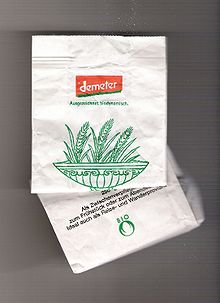- Demeter International
-
Demeter International is the largest certification organization for biodynamic agriculture, and is one of three predominant organic certifiers.[1] Its name is a reference to Demeter, the Greek goddess of grain and fertility. Demeter Biodynamic Certification is used in over 50 countries to verify that biodynamic products meet international standards in production and processing.[2] The Demeter certification program was established in 1928, and as such was the first ecological label for organically produced foods.[3]
The certification is the oldest traditional organic certification in Europe and is regarded as the highest grade of organic farming in the world[citation needed]. Certification is difficult to come by and must be renewed annually.[4] Demeter’s “biodynamic” certification requires biodiversity and ecosystem preservation, soil husbandry, livestock integration, prohibition of genetically engineered organisms and viewing the farm as a living “holistic organism”.[1][5] The certification verifies the fulfillment of the standards on behalf of the farmers, which in turn guarantees high quality food products to the consumers. This is rewarded by receiving a higher price for food certified with the “Demeter” label, ranging from 10-30% on average.[6]
References
- ^ a b Commission for Environmental Cooperation and TerraChoice Environmental Services Inc, Environmental and Other Labelling of Coffee: the role of mutual recognition, supporting cooperative action, May 2004. Document text
- ^ Demeter certification in New Zealand
- ^ Steve Diver, Biodynamic Farming & Compost Preparation, Alternative Farming Systems Guide: ATTRA, February 1999. Document text
- ^ Biodynamic Berries: Ancient ways are the next step in organic winemaking
- ^ Overview of Demeter certification requirements
- ^ Stephan Rist and Lucas Rist, "Towards a post-materialist understanding of science – lessons learnt form the interface of biodynamic agriculture and research." Presented at conference Bridging Scales and Epistemologies: Linking Local Knowledge with Global Science in Multi-Scale Assessments, March 2004. Document text
External links
Anthroposophy Founders of the Anthroposophical Society Rudolf Steiner - Albert Steffen - Marie Steiner-von Sivers - Ita Wegman - Elisabeth Vreede - Guenther Wachsmuth - Edith MaryonAnthroposophists Georg Kühlewind - Jesaiah Ben-Aharon - Dennis Klocek - Ehrenfried Pfeiffer - Theodor Schwenk - Emil Bock - Bernard Lievegoed - Sergei Prokofieff - Jens Bjørneboe - Aasmund Brynildsen - Alan Chadwick - Daniel Nicol Dunlop - John Fentress Gardner - Walter Burley Griffin - Karl König - Robert A. McDermott - Arthur Zajonc - Douglas M. Sloan - Pietro Archiati - Marjorie Spock - Christopher Bamford - Henry Barnes - Walter Johannes Stein - Ernst Lehrs - E. A. Karl Stockmeyer - Herbert Witzenmann - Massimo Scaligero - Ross Rentea - Rudolf Hauschka - Oskar Schmiedel - Hermann Poppelbaum - Alfred MeeboldNotable Supporters Anthroposophical texts Philosophy of Freedom - How to Know Higher Worlds - An Outline of Esoteric ScienceCultural Influences Waldorf education - Anthroposophical medicine - Biodynamic agriculture - Camphill Movement - Eurythmy - Threefold social order - Anthroposophical architecture - The Christian Community -Institutions, publications General Anthroposophical Society - Anthroposophical Society in America - Goetheanum - GLS bank - Demeter International - SEKEM - Harduf - Triodos Bank - RSF Social Finance -Categories:- Agricultural organizations
- Anthroposophy
- Organic farming organizations
- Agriculture stubs
Wikimedia Foundation. 2010.

